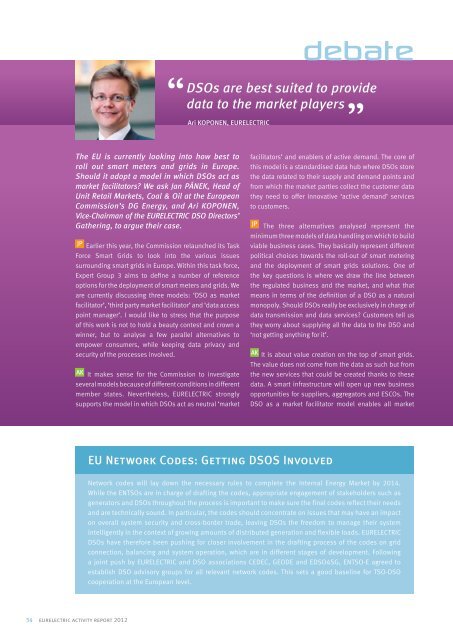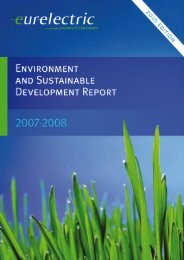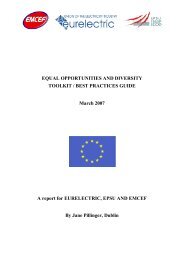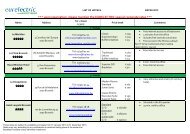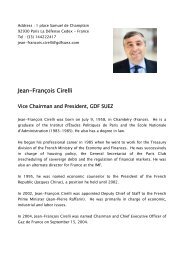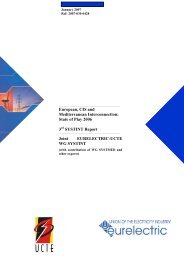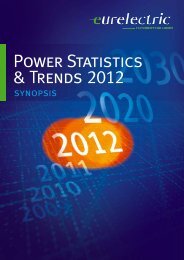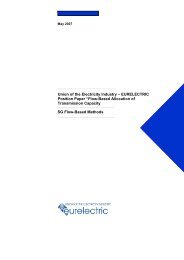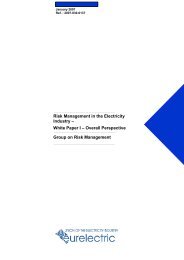Activity Report 2012 - Eurelectric
Activity Report 2012 - Eurelectric
Activity Report 2012 - Eurelectric
You also want an ePaper? Increase the reach of your titles
YUMPU automatically turns print PDFs into web optimized ePapers that Google loves.
The EU is currently looking into how best to<br />
roll out smart meters and grids in Europe.<br />
Should it adopt a model in which DSOs act as<br />
market facilitators? We ask Jan PÁNEK, Head of<br />
Unit Retail Markets, Coal & Oil at the European<br />
Commission’s DG Energy, and Ari KOPONEN,<br />
Vice-Chairman of the EURELECTRIC DSO Directors’<br />
Gathering, to argue their case.<br />
JP Earlier this year, the Commission relaunched its Task<br />
Force Smart Grids to look into the various issues<br />
surrounding smart grids in Europe. Within this task force,<br />
Expert Group 3 aims to define a number of reference<br />
options for the deployment of smart meters and grids. We<br />
are currently discussing three models: ‘DSO as market<br />
facilitator’, ‘third party market facilitator’ and ‘data access<br />
point manager’. I would like to stress that the purpose<br />
of this work is not to hold a beauty contest and crown a<br />
winner, but to analyse a few parallel alternatives to<br />
empower consumers, while keeping data privacy and<br />
security of the processes involved.<br />
Ak It makes sense for the Commission to investigate<br />
several models because of different conditions in different<br />
member states. nevertheless, EURELECTRIC strongly<br />
supports the model in which DSOs act as neutral ‘market<br />
34 eurelectric activity report <strong>2012</strong><br />
debate<br />
DSOs are best suited to provide<br />
data to the market players<br />
Ari koPonEn, EURELECTRIC<br />
facilitators’ and enablers of active demand. The core of<br />
this model is a standardised data hub where DSOs store<br />
the data related to their supply and demand points and<br />
from which the market parties collect the customer data<br />
they need to offer innovative ‘active demand’ services<br />
to customers.<br />
JP The three alternatives analysed represent the<br />
minimum three models of data handling on which to build<br />
viable business cases. They basically represent different<br />
political choices towards the roll-out of smart metering<br />
and the deployment of smart grids solutions. One of<br />
the key questions is where we draw the line between<br />
the regulated business and the market, and what that<br />
means in terms of the definition of a DSO as a natural<br />
monopoly. Should DSOs really be exclusively in charge of<br />
data transmission and data services? Customers tell us<br />
they worry about supplying all the data to the DSO and<br />
‘not getting anything for it’.<br />
Ak It is about value creation on the top of smart grids.<br />
The value does not come from the data as such but from<br />
the new services that could be created thanks to these<br />
data. A smart infrastructure will open up new business<br />
opportunities for suppliers, aggregators and ESCOs. The<br />
DSO as a market facilitator model enables all market<br />
EU Network Codes: Getting DSOS Involved<br />
network codes will lay down the necessary rules to complete the Internal Energy Market by 2014.<br />
While the EnTSOs are in charge of drafting the codes, appropriate engagement of stakeholders such as<br />
generators and DSOs throughout the process is important to make sure the final codes reflect their needs<br />
and are technically sound. In particular, the codes should concentrate on issues that may have an impact<br />
on overall system security and cross-border trade, leaving DSOs the freedom to manage their system<br />
intelligently in the context of growing amounts of distributed generation and flexible loads. EURELECTRIC<br />
DSOs have therefore been pushing for closer involvement in the drafting process of the codes on grid<br />
connection, balancing and system operation, which are in different stages of development. Following<br />
a joint push by EURELECTRIC and DSO associations CEDEC, GEODE and EDSO4SG, EnTSO-E agreed to<br />
establish DSO advisory groups for all relevant network codes. This sets a good baseline for TSO-DSO<br />
cooperation at the European level.


